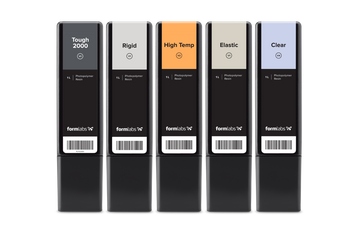In the ever-evolving world of 3D printing, Formlabs never ceases to amaze. As the Country Manager of 3DVerkstan Danmark, I'm thrilled to introduce our community to the BioMed Flex 80A Resin and BioMed Elastic 50A Resin – two groundbreaking materials that promise to redefine medical 3D printing.
Formlabs' latest offerings, the BioMed Flex 80A Resin and BioMed Elastic 50A Resin, are set to revolutionize the medical 3D printing landscape. These materials are designed for direct 3D printing of elastomeric, biocompatible medical devices and models, offering a seamless solution for medical device manufacturing and point-of-care applications.
Historically, professionals in the medical field have had to grapple with cumbersome silicone molding processes or resort to expensive outsourcing. With these new resins, the tedious multi-step processes become a thing of the past. Medical professionals can now enjoy the benefits of traditional elastomeric materials combined with the simplicity and efficiency of Formlabs' resin 3D printers.
What truly sets these materials apart is their rigorous testing and certification. Produced in an FDA-registered, ISO 13485-certified facility, and having undergone ISO 10993 and USP Class VI testing, these resins ensure utmost confidence for medical professionals. As Formlabs continues to expand its biocompatible materials library, the horizons for 3D printing in medical applications are broadened, promising enhanced patient care, cost savings, and limitless possibilities.
However, the journey to this innovation wasn't without its challenges. The medical industry has long yearned for a 3D printing solution that offers both flexibility and biocompatibility. Traditional elastomeric 3D printing materials posed limitations at various stages of design and manufacturing. These constraints often hindered the design cycle, impacting product performance and time-to-market.
But with the introduction of BioMed Flex 80A Resin and BioMed Elastic 50A Resin, these challenges are addressed head-on. These resins offer the perfect blend of flexibility, transparency, and biocompatibility, enabling a myriad of applications, from patient-specific surgical models to customized medical devices.
Dr. Prashanth Ravi from the University of Cincinnati, a long-time user of Formlabs' specialized resins, expressed his enthusiasm for the new materials, emphasizing their potential in various clinical applications. Similarly, Allison Neuwirth from Northwell Health highlighted the efficiency and waste reduction these materials bring to the table, eliminating the need for labor-intensive silicone molding.
The technical specifications of these resins further underscore their versatility. BioMed Flex 80A Resin, with its Shore hardness of 80A and elongation of 120% at break, is perfect for flexible components on devices and patient-specific instruments. On the other hand, BioMed Elastic 50A Resin, with its Shore hardness of 50A and elongation of 150% at break, is ideal for soft-tissue models and long-term skin contact parts.
Conclusion:
The BioMed Flex 80A Resin and BioMed Elastic 50A Resin are not just materials; they represent a paradigm shift in medical 3D printing. By bridging the gap between flexibility, biocompatibility, and 3D printing, Formlabs has set a new benchmark for the industry. As we at 3DVerkstan Danmark continue to explore these innovations, we're eager to witness their transformative impact on the Danish medical landscape and beyond.







